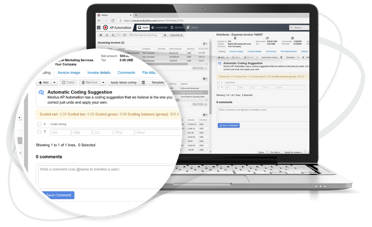Debunking common myths about e-invoicing
- Introduction
- E-invoicing doesn't require a complex IT setup
- E-invoicing is not just for large enterprises
- PDFs are not true e-invoices
- Compliance isn’t the only reason to adopt e-invoicing
- E-invoicing needs ongoing flexibility
- Suppliers can easily adopt e-invoicing too
- Moving past the myths and toward smarter AP
- Simplify e-invoicing with Medius
Hear what's covered in this article:
Electronic invoicing is rapidly becoming the new standard in modern finance operations. Yet despite widespread adoption across industries, many businesses still hesitate to make the switch due to long-standing misconceptions. These e-invoicing myths often stem from outdated systems, misinformation, or fear of complexity—and they can slow down digital transformation and put organizations at risk of falling behind.
E-invoicing is not just a compliance requirement. It’s a powerful tool that unlocks automation, improves supplier relationships, and increases visibility across accounts payable (AP) workflows. Let’s take a closer look at the most common myths about e-invoicing and uncover what’s really true.
E-invoicing doesn't require a complex IT setup
One of the most persistent misconceptions is that implementing electronic invoicing involves complicated software installations or IT overhauls. In reality, modern AP automation platforms have made e-invoicing highly accessible—even for organizations with limited technical resources.
Today’s solutions use artificial intelligence and machine learning to process invoices in multiple formats, including PDFs, XML, and EDI files, without requiring custom templates or coding. The technology automatically extracts and validates invoice data, streamlining the process and eliminating manual setup. This shift has made it easier for businesses of all sizes to get started quickly—without placing additional burden on IT teams.
E-invoicing is not just for large enterprises
There’s a common assumption that only multinational corporations benefit from electronic invoicing. This myth ignores the scalability of today’s AP automation tools.
In fact, small and mid-sized businesses are among the biggest beneficiaries of e-invoicing. By replacing paper-based or email-based processes with automated workflows, these companies can eliminate bottlenecks, reduce payment errors, and improve cash flow visibility. And as more governments roll out e-invoicing mandates—including for small suppliers—having a scalable system in place becomes a competitive necessity.
PDFs are not true e-invoices
Many companies believe they are already using e-invoicing simply because they receive invoices by email in PDF format. But true e-invoices are much more than digital files—they are structured data formats designed for machine reading and automated processing.
Unlike PDFs, which typically require manual data entry or OCR scanning, structured e-invoices (like EDI or XML) can be imported directly into the AP system without human intervention. This eliminates the risk of transcription errors, accelerates processing, and supports regulatory compliance. In other words, sending a PDF by email is not e-invoicing—it’s just paperless invoicing.
Compliance isn’t the only reason to adopt e-invoicing
While tax compliance is a key driver for e-invoicing adoption, the benefits extend far beyond satisfying regulators. Electronic invoicing plays a strategic role in streamlining accounts payable workflows, reducing fraud risk, and improving supplier satisfaction.
With e-invoicing, businesses can automate invoice validation, match invoices to purchase orders, and flag anomalies before they become issues. It enables AP teams to focus on higher-value tasks like forecasting and strategic spend management. And as more countries move toward real-time reporting and clearance models, the value of being ahead of the compliance curve only grows.
E-invoicing needs ongoing flexibility
Some businesses assume that once e-invoicing is implemented, the process is “set and forget.” But the global regulatory landscape is constantly evolving—and so are invoice standards.
Countries like France and Italy are updating e-invoicing mandates with stricter validation rules, real-time submission models, and new technical specifications. This makes it essential for businesses to adopt systems that can easily adapt to new formats and requirements without major overhauls. Cloud-based platforms powered by AI are particularly well-equipped to handle these changes automatically, ensuring that compliance never becomes a bottleneck.
Suppliers can easily adopt e-invoicing too
A common objection to e-invoicing is the belief that suppliers will resist the change. But more vendors are embracing electronic invoicing as they realize the benefits of faster payments, fewer errors, and better visibility.
Modern supplier portals make the transition easy by allowing vendors to submit invoices directly or convert purchase orders into e-invoices in just a few clicks. These tools eliminate the need for expensive integrations and ensure a smoother collaboration between buyers and suppliers.
Moving past the myths and toward smarter AP
The longer businesses hold on to these myths, the more they miss out on the transformative potential of e-invoicing. Electronic invoicing is no longer a complex, enterprise-only tool. It’s a foundational element of modern accounts payable—and essential for scaling operations, improving compliance, and unlocking real-time financial insights.
Simplify e-invoicing with Medius
Medius makes it easy to leave the myths behind. Our AI-powered AP automation platform helps you digitize invoice capture, ensure global e-invoicing compliance, and streamline every step of your AP process. Whether you’re transitioning from PDFs or preparing for new mandates, Medius provides the technology and support to help you modernize with confidence.

Book a demo today and see how Medius can simplify e-invoicing, strengthen supplier collaboration, and future-proof your financial operations.






